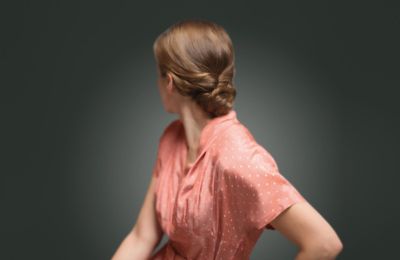“The Scribe” Zofia Posmysz. A witness to history between truth and post-truth

Extracts from the report of the “scribe” Zofia Posmysz, compiled by Maria Anna (Masza) Potocka:
Whispering can be loudest
After a six-month period of investigation during which I was interrogated on four occasions I was moved from Kraków to Auschwitz and although I had already heard a lot about Auschwitz the information did not worry me. I was even delighted, because it meant that I would no longer be summoned to the headquarters of the Gestapo. At the time interrogations were our worst nightmare.
As I approached the gates of the camp and saw the writing “Arbeit macht frei” (Lit: Work makes you free), I naïvely thought that it certainly can’t be that bad. I thought that if I worked, they would free me for I had not been subject to any serious trial. I thought that I could work for my freedom.
At the start, when I was assigned to the “External Kommando”, they woke us at 3:30 in the morning. Without a doubt this was so early because the SS was still in array at the time. First you had to bring the cauldron with the coffee and tea from the kitchen to the blocks and dish out the contents into beakers and plates. They called it breakfast. Some prisoners were disciplined enough to keep back a slice of bread from the evening before. By contrast others only had a liquid breakfast in the morning and went to work hungry.
The work in the first half of the day lasted until 12.30. Then trucks arrived with cauldrons of soup. After this we had a half hour break during which we were allowed to lie down. Some people even managed to doze off. This was followed by the next phase of work, which lasted until 6 o’clock. On our return to the camp, we were immediately ordered to line up for the evening roll call. Here an SS man or woman checked the names of the people living in the block along with one of the prisoners who was on the list. Then a whistle ended the roll call. After that we went to the kitchen to get our evening coffee or tea and our ration of food, above all bread. Each prisoner was allowed one third of a kilogram from the loaf. But in fact we never got such a portion because the woman who was in charge of the block kept some of it for herself. For the bread there was a small piece of margarine or cheese, which they called quark. This was a German or Austrian speciality, a sort of Camembert, and I even liked the taste of this cheese.
Our first work after arriving in house consisted of breaking up clods of earth on a field some kilometres away from the camp. This was cruel, bone-breaking work. On top of which came hunger, appalling heat and a lack of liquid. After work we lined up in the evening in front of the well with our plates or half-litre beakers. A problem arose: what can you do with so little water? Most people drank it all. Others washed their faces. But I also saw girls who went behind the latrine to wash their lower parts with water. I thought this was absurd and extravagant.
After our return from the punishment battalion, we were tattooed with a number in Birkenau. This was done by a woman prisoner sitting on a tiny stool behind a small table. She had a funny tool which reminded me most of a fountain pen. She used this gadget to prick our skin and tattoo the number. The woman who did this, a Jew, well that’s the way she looked to me, told me to roll up my sleeves so that she could tattoo my number higher up.














